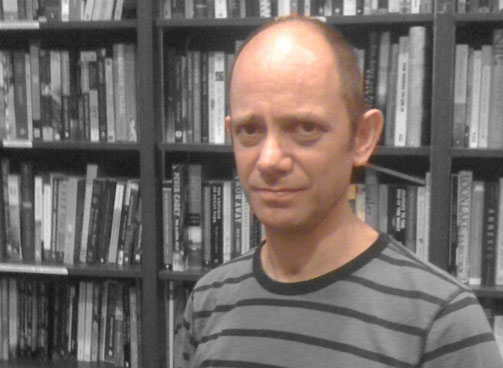Damon Galgut & The Fiction of Memory

Damon Galgut’s In a Strange Room is marketed as fiction; heck, it was on the short list for this year’s Man Booker Prize, which is awarded to the year’s best fiction (at least among those written by citizens of the Commonwealth of Nations or the Republic of Ireland). But its three sections are about the travels of a South African man named Damon. I didn’t want to fall into the trap of assuming an autobiographical aspect to a work of fiction, I explained to Galgut as we met at Housing Works Bookstore last week, but… “it’s about a man named Damon, who’s South African,” he filled in, smiling slightly.
“My project in this book was to tell the truth,” he explained. “There’s no invention, strictly speaking. It’s me remembered as honestly as possible… how the journeys unfolded and how my relationships with my traveling companions changed.” When The Paris Review began to publish the sections, an editor there asked Galgut how they should be labeled: Were these travelogues? Were they memoir? Were they stories? “I couldn’t really answer that question… The Paris Review made the decision to run it as fiction, and I’ve become more happy with that choice over time.”
As he sees it, consciousness relies upon memory and memory is, at heart, an act of fiction: “In narrating to ourselves the story of our lives… we tend to join the dots. Stories are about giving meaningful structure to a set of events.” The emphasis on recounting his memories as accurately as he could also led Galgut to the unusual narrative voice of In a Strange Room, which frequently shifts perspectives within a single paragraph. “Sometimes you’re back there in the moment,” he explains, “and sometimes you’re a stranger to yourself, watching yourself in the past.”
The three stories also explore what Galgut describes as “the full complex of human relationships,” from power dynamics to love and guardianship. (And though each section is named with one of those elements in mind, all come into play in each section in varying degrees.) It can take a while to get used to the voice, but once you adjust to the unstable ground and accept Galgut’s best recollections in good faith, it is a… well, happy isn’t the right word; let’s say it’s a highly rewarding experience.
23 November 2010 | interviews |
Book Breakthrough: Interviews and Workshops
Recently, I exchanged emails with Debra Eckerling of Write On Online for a Q&A about Beatrice and writing, where she invited me to talk about some of the most common mistakes writers make. Taking a cue from Merlin Mann, I mentioned the importance of actually writing rather than simply calling yourself a writer, but then I also touched upon the need to understand the business side of writing, including the marketing, and in particular the potential advantages of using social media: “You need readers,” I said, “and as wonderful as it would be for people to just discover you over and over again by happy accident, it doesn’t work that way very often. You need to be out there where your potential readers are, get to know them, and let them get to know you.”
I’m going to be talking along similar lines next week at the Book Breakthrough Workshop, which is being held on July 29-31 here in New York City. My friends Janet Goldstein and Liz Marshall, who both have extensive experience helping authors (especially nonfiction writers) refine their message and build up their audiences, have put together a great lineup of guest speakers, and I’m delighted to be able to give a short presentation during the portion of the workshop that focuses on connecting with potential readers. The specific focus of my talk is going to be book trailers, and the ways we should be thinking about what makes them succeed, rather than just hoping for a gazillion views. The other speakers should be pretty amazing, too, so if you’re in the New York area, and you’re serious about wanting a career as a nonfiction writer, this should be a worthwhile experience.
23 July 2010 | events, interviews |

 Our Endless and Proper Work is my new book with Belt Publishing about starting (and sticking to) a productive writing practice.
Our Endless and Proper Work is my new book with Belt Publishing about starting (and sticking to) a productive writing practice. 
